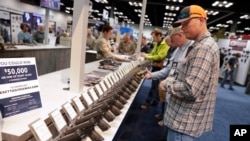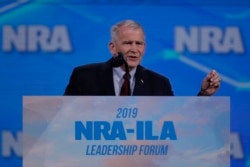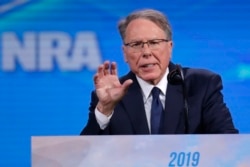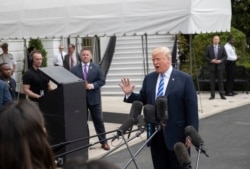A nationwide call for increased regulation of firearms, sparked by the mass shootings in Texas and Ohio over the weekend, comes at a time when one of the most powerful voices on the pro-gun rights side of the argument, the National Rifle Association, is mired in multiple scandals and reeling from infighting among its top leadership.
Gun rights activists would normally be looking to the NRA to take the lead in combating calls for tighter gun laws. The NRA is the largest of the U.S. gun rights organizations that lobby lawmakers to block new gun regulations. In 2018, the NRA spent more than $5 million on its lobbying operations, making it the largest component of the broader gun rights lobby, which collectively spent more than $12.1 million, according to the Center for Responsive Politics.
The NRA and its allies also have the support of a firearms industry that takes in billions of dollars every year in revenue. According to the business research firm IBISWorld, stores that sell guns and ammunition took in about $11 billion in revenue last year, and their businesses have grown at more than twice the rate of the broader U.S. economy over the past five years.
NRA difficulties
The NRA has run into a rough patch. It is facing investigations into its tax-exempt status in New York, a congressional inquiry into its ties to figures associated with the Russian government, and a court battle with Ackerman McQueen, the advertising firm that for decades helped sculpt the group's public image.
It is also confronting these challenges at a time when its top leadership is under unprecedented strain. In April, the organization's president, Oliver North, was forced out after a public split with NRA CEO Wayne LaPierre. Christopher Cox, the organization's second-in-command and its chief lobbyist, was forced out in June after LaPierre accused him of leading a coup against his leadership.
LaPierre, North rewarded
In the fallout from that struggle, documents were leaked to news organizations that revealed both LaPierre and North were benefiting from NRA money above and beyond their already sizable salaries.
North had an agreement with Ackerman McQueen that would have paid him millions of dollars to host a television program on the NRA's network, according to The Washington Post. LaPierre, who has spent decades in leadership roles at the NRA, was alleged to have spent hundreds of thousands of dollars of the organization's money on designer clothing and luxury travel, The Wall Street Journal reported.
Further leaks to The New York Times revealed that multiple members of the NRA's board of directors were also profiting from their association with the group, either through payments from the NRA or its associated foundation, or through arrangements with vendors closely tied to the group.
Donor threats
The revelations have driven some of the group's major donors to protest, threatening to cut off the flow of funding unless action is taken to limit what one disaffected board member -- Allen West, a retired U.S. Army lieutenant colonel and former Florida congressman -- called a "cabal of cronyism."
That the NRA is facing many internal struggles at a time when calls for new gun regulations are being demanded might convince some that its political pressure tactics — historically highly effective — will be blunted in Washington. However, it would probably be a mistake to count the group out.
Over the past several decades, the NRA has amassed an effective record in Washington. Its grading system for lawmakers has kept conservative lawmakers largely in line with its policies, even as those policies have become increasingly hostile to most regulation.
Track record
In 2004, when a 10-year ban on the sale of "assault weapons" was due to expire, the NRA successfully lobbied against efforts to renew it. In 2013, the group helped defeat a bipartisan measure in the Senate, sponsored by West Virginia Democrat Joe Manchin and Pennsylvania Republican Pat Toomey, that would have greatly expanded the current system of background checks for gun buyers.
In 2018, when President Donald Trump responded to a mass shooting at a high school in Parkland, Florida, with support for raising the age limit for certain firearms purchases and for expanding background checks, NRA leaders promptly demanded a meeting at the White House. The president backed away from the plan shortly afterward.
Kyleanne Hunter, vice president of programs at the Brady Campaign to Prevent Gun Violence, declined to speculate as to whether the NRA's effectiveness in the current environment might be diminished by its internal struggles.
She said, however, "The American people are overwhelmingly in support of very common sense gun violence prevention measures, ranging from background checks to extreme risk protective orders to an assault weapons ban."
"What I think is important to note right now is that the NRA does not speak for the American people," Hunter added. "For a long time, the NRA has not spoken for the American people. It's spoken for the corporate gun lobby and has used fear and divisiveness to try to sell guns, not to keep American people safe."
Second Amendment
In the wake of the shootings in El Paso and Dayton, the NRA followed the same playbook it has used for similar events over the years, issuing a terse statement of support for the victims and law enforcement, and a demand that the attacks not be "politicized."
"Our deepest sympathies are with the families and victims of these tragedies, as well as the entire communities of El Paso and Dayton," the NRA stated. "On behalf of our millions of members, we salute the courage of the first responders and others offering their services during this time.
"The NRA is committed to the safe and lawful use of firearms by those exercising their Second Amendment freedoms," the NRA statement added. "We will not participate in the politicizing of these tragedies but, as always, we will work in good faith to pursue real solutions that protect us all from people who commit these horrific acts."
Republican support
Whether or not the NRA will be able to once again rally its allies in Congress to defeat new gun control legislation remains to be seen, but its influence was on display in the hours and days after the two most recent mass shootings in U.S. cities. Support for the group has, over the past decade, hardened along party lines, with nearly all of its supporters in Congress on the Republican side of the aisle.
On Sunday, a parade of GOP politicians took to the airwaves to blame any number of cultural factors for the massacres, from lack of mental health treatment to violent video games to gay marriage and transgender individuals. However, very few of them acknowledged that other countries around the world with similar cultural climates do not have epidemic levels of gun violence, as the U.S. does.
Trump, the top Republican in the country, briefly floated the idea of taking action on increased gun regulations on Sunday and Monday. Speaking with reporters Sunday afternoon as he returned from a weekend at his New Jersey golf resort, he said, "Perhaps more needs to be done" to address the problem.
On Twitter early Monday morning, Trump seemed open to supporting an effort to strengthen background checks on gun buyers.
"Republicans and Democrats must come together and get strong background checks, perhaps marrying this legislation with desperately needed immigration reform," he wrote.
Hours later in remarks delivered from the White House, Trump laid out a multipart plan for addressing gun violence that conspicuously avoided any mention of background checks, but focused instead on the cultural issues raised by Republicans a day earlier, including mental health care and video games.
Addressing the mental health issue, he said, "Mental illness and hatred pulls the trigger, not the gun" — a statement that recalls the NRA's decades-old talking point that "Guns don't kill people. People do."



